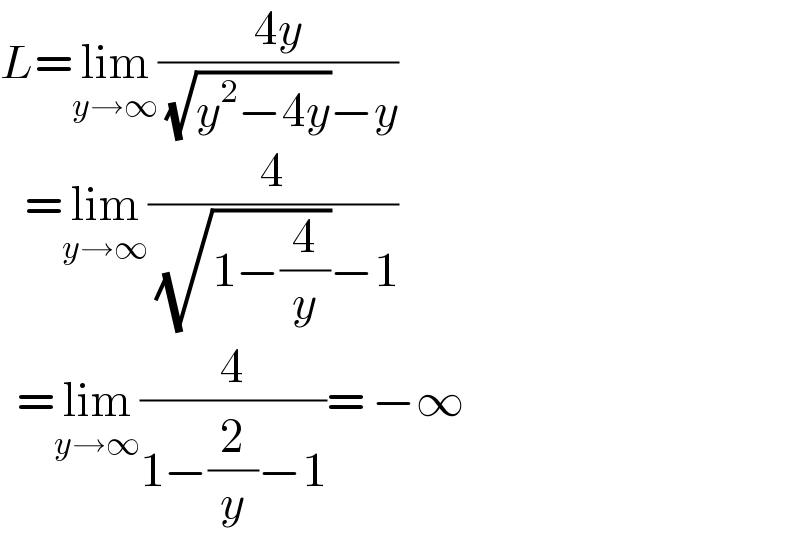Question Number 149700 by Lekhraj last updated on 06/Aug/21

Commented by iloveisrael last updated on 07/Aug/21

$$\underset{{x}\rightarrow−\infty} {\mathrm{lim}}\left(\mathrm{x}+\mathrm{x}\sqrt{\mathrm{1}+\mathrm{4x}^{−\mathrm{1}} }\right) \\ $$$$=\:\underset{{x}\rightarrow−\infty} {\mathrm{lim}x}\left(\mathrm{1}+\sqrt{\mathrm{1}+\mathrm{4x}^{−\mathrm{1}} }\:\right) \\ $$$$=−\infty×\mathrm{2}\:=\:−\infty \\ $$
Answered by MJS_new last updated on 06/Aug/21

$$\sqrt{{x}^{\mathrm{2}} +\mathrm{4}{x}}>\mathrm{0}\:\mathrm{if}\:{x}<−\mathrm{4} \\ $$$$\Rightarrow\:\mathrm{very}\:\mathrm{obviously}\:\mathrm{the}\:\mathrm{limit}\:\mathrm{is}\:−\infty \\ $$
Answered by ajfour last updated on 06/Aug/21

$${L}=\underset{{y}\rightarrow\infty} {\mathrm{lim}}\frac{\mathrm{4}{y}}{\:\sqrt{{y}^{\mathrm{2}} −\mathrm{4}{y}}−{y}} \\ $$$$\:\:\:=\underset{{y}\rightarrow\infty} {\mathrm{lim}}\frac{\mathrm{4}}{\:\sqrt{\mathrm{1}−\frac{\mathrm{4}}{{y}}}−\mathrm{1}} \\ $$$$\:\:=\underset{{y}\rightarrow\infty} {\mathrm{lim}}\frac{\mathrm{4}}{\mathrm{1}−\frac{\mathrm{2}}{{y}}−\mathrm{1}}=\:−\infty \\ $$
